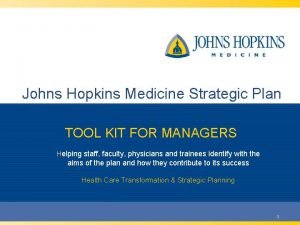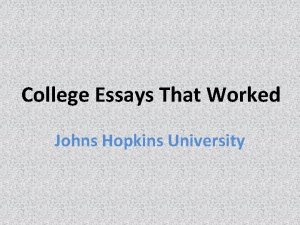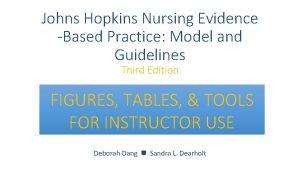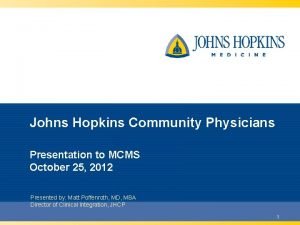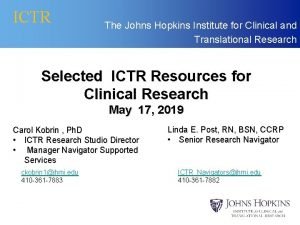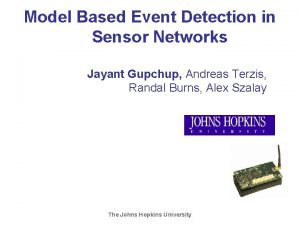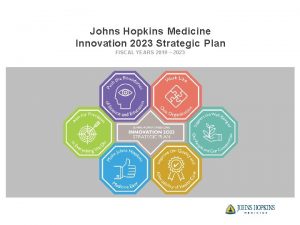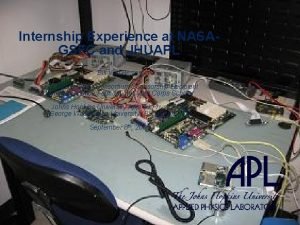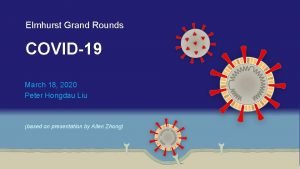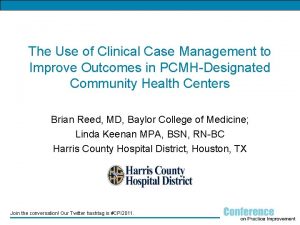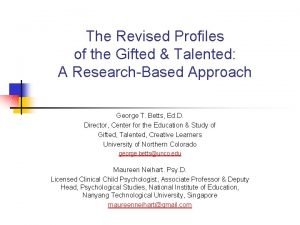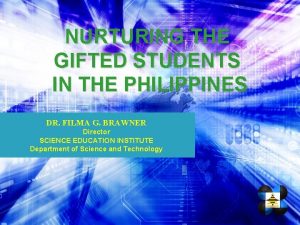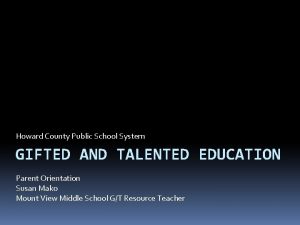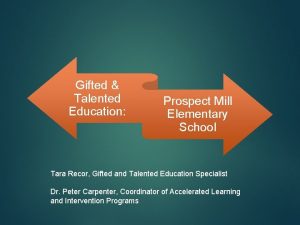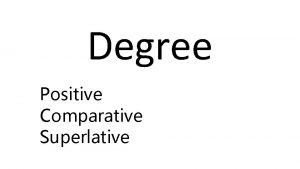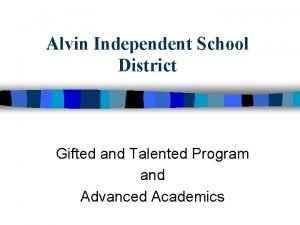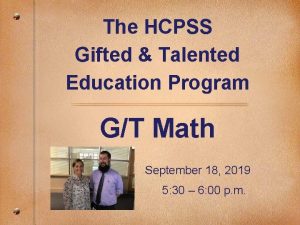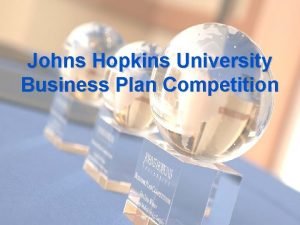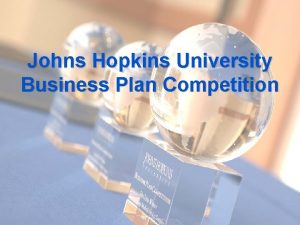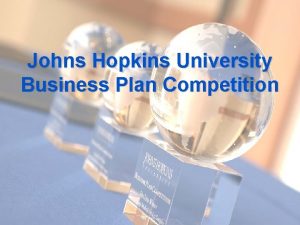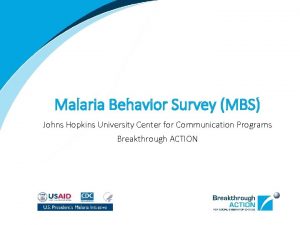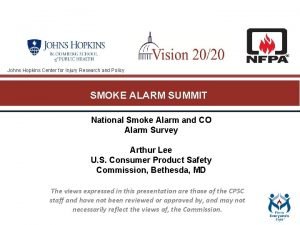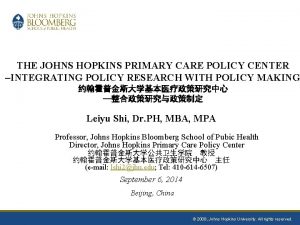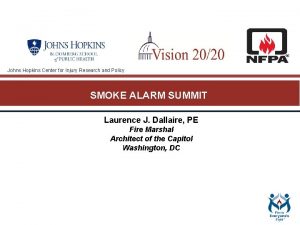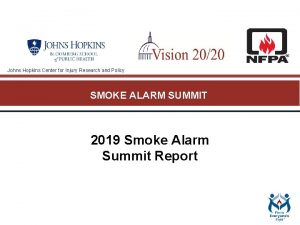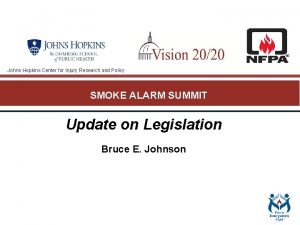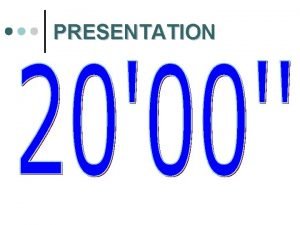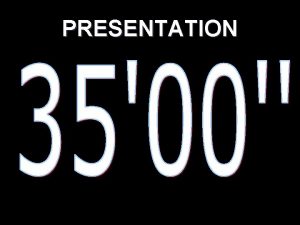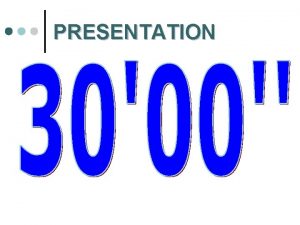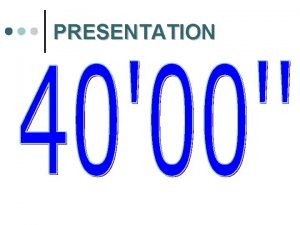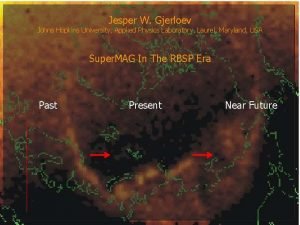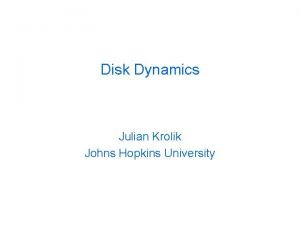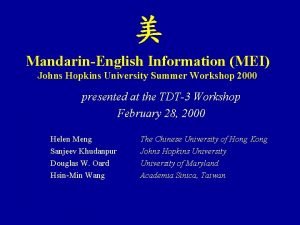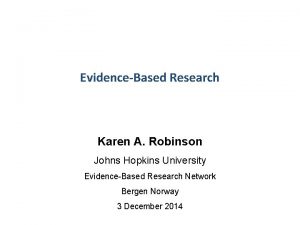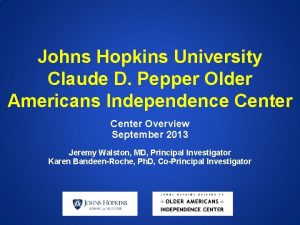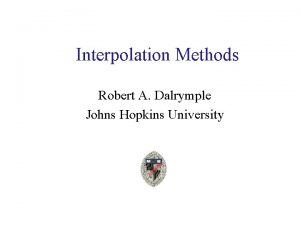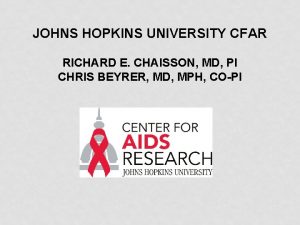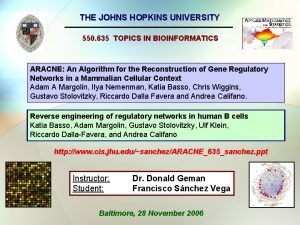JOHNS HOPKINS UNIVERSITY Center for Talented Youth Presentation
























- Slides: 24

JOHNS HOPKINS UNIVERSITY Center for Talented Youth Presentation to National Science Board Preparing the Next Generation of STEM Innovators Arlington, VA August 24 -25, 2009 9/26/2020

The Need to Nurture Young Talent “Disturbingly, research has confirmed that many talented children perform far below their intellectual potential. We are increasingly being stripped of the comfortable notion that a bright mind will make its own way. Intellectual and creative talent cannot survive educational neglect and apathy. ” (Marland, 1972) “The United States is squandering one of its most precious resources—the gifts, talents, and high interests of many of its students. …In a broad range of intellectual and artistic endeavors, these youngsters are not challenged to do their best work. ” (U. S. Department of Education, 1993)

How do we Initiate the Innovation Process? § By viewing gifted students without sterotypes or misconceptions § By identifying and recognizing young academic potential § By offering innovative and challenging curriculum § By meeting students social-emotional as well as their academic needs § By creating a supportive environment that enables students to reach their highest potential and to let their talent soar.

Mission: Meeting the Needs of Gifted Students The Johns Hopkins University Center for Talented Youth (CTY) is recognized as a world leader in the education of pre-college youth with high academic potential.

What is CTY? Founded in 1979, the Center for Talented Youth (CTY) is an institute of The Johns Hopkins University. CTY nurtures and supports talented pre-college students by offering challenging and innovative academic courses and providing other related services for grades K-12 th (ages 5 -18).

The CTY Talent Search § CTY is the oldest and most extensive university-based talent search, now in operation almost 30 years § Works with thousands of schools to identify the top 5% of students § Through its Talent Search and programs, has served over 1, 500, 000 highly gifted children in the US and other countries since 1979.

Thousands of students from the United States and over 100 other countries participate in CTY programs.

CTY Summer Programs CTY offers advanced academic courses for K-12 students at 30 sites. § In the U. S. , there are sites at universities such as Johns Hopkins, Princeton and Stanford. § Over 10, 000 students enroll in CTY summer programs every year; – Grades 2 -4 (ages 7 -9 years) commuter programs only – Grades 5 -6 (ages 10 -11 years) commuter or residential – Grades 7 -12 (ages 12 -18 years) residential only

Examples of Courses in Mathematics and Science for 7 -12 grades (ages 11 -18 years) § Biomedical Sciences § Biotechnology § Genetics § Neuroscience § Introduction to Math Reasoning § Mathematical Modeling § Number Theory § Foundations of Computer Science § Electrical Engineering § Bay Ecology Engineering Design § Fast Paced High School Physics § Topics in Advanced Chemistry § Astronomy § Medical Science: Pharmacology & Toxicology § Paleobiology and Formal Proof § Robotics § Oceanography § Marine Physics & Engineering § Bioethics § The History of Disease § The Mathematics of Money § Principles of § Reasoning, Logic,

CTY Summer Programs – continued Examples of courses for young students: § Grades 2 -4 th (ages 7 -9 years) § Grades 5 -6 (ages 10 -12 years) – Numbers: Zero to Infinity Math – Great Discoveries in Mathematics Problem Solving – Inductive & Deductive Reasoning – Math Sequencing – The Ancient World – Model United Nations & – Geometry and Spatial Sense Advanced Geography – Flight Science – Dynamic Earth & Our Universe – Be a Scientist! – Crystals and Polymers – Through the Microscope (Introduction to Chemistry) – Science and Engineering – Inventions – Flight Science – Introduction to Robotics

CTYOnline - Distance Education § CTYOnline courses are taken by over 8, 000 students a year in 60 countries. § Courses are offered in Writing, Mathematics, Science and Advanced Placement courses such as physics and chemistry. § Language courses in Arabic and Chinese are also offered online.

CTY Collaboration with JHU School of Medicine A sequence of courses to understand genetics is taken by students in grades 8 -10 (ages 12 -14) § § § CTY Summer Course in Biology § Students Assigned to work with JHU School of Medicine Research Scientists and Physicians CTY Summer Course in Genetics CTY Summer Course in Genomics – students visit the Johns Hopkins Center of Excellence in Genome Sciences (CEGS) and the National Human Genome Research Institute and participate in lab demonstrations and lectures offered by CEGS faculty on topics such as epigenetics and human diseases.

JHU Material Research Science and Engineering Center Project § Established by the JHU School of Engineering with a grant from the National Science Foundation § Components include – High school student interns – High school teacher interns – Intensive summer research programs

MRSEC Participants § To date there have been 176 participants § Students participate in multi-disciplinary research programs ranging from physics to electronic and biomedical devices § Of MRSEC participants who have graduated from college or are currently in college: – 70 % have received a degree in engineering or have declared engineering as a major – 25% have declared pre-med/biology as majors – 95% of students have continued in engineering/science majors

Investing in America’s Future Expanding the future educational pipeline to top colleges and universities § Jack Kent Cook Young Scholars Program § Goldman Sachs Next Generation Venture Fund § John Templeton Foundation § Cogito. org for top math and science students § Students from the U. S. and 80 countries enrolled

Program Impact “I have considered engineering as a career, but what I knew about engineering was based only on what other people told me. Now, I know firsthand what engineering is all about and I feel confident that this field is right for me. ” (High School Intern Morris Cohen, received his Ph. D. In Electrical Engineering from Stanford University) “I came away from the MRSEC internship intellectually refreshed and eager to incorporate practical examples and activities from the latest hightech materials science into my curriculum. ” (High School Teacher Intern, Lee Kladky, Baltimore, Maryland)

Strategies That Work: CTY’s Urban Outreach Initiatives §Reflecting the Face of America in gifted education programs §Focusing outreach efforts to find and develop talent in all of America’s neighborhoods. § Identifying, recruiting, and serving rising numbers of youngsters from groups historically underrepresented in gifted and talented programs.

§ Have established aggressive and sustained recruiting efforts in urban areas by full-time outreach specialists. § Over $5 million in financial aid awarded to CTY students in 2008. § Math Academy for Promising. Scholars established in low income areas to improve the mathematics skills of students.

Strategies that Work (cont. ) What We Have Learned in Working With Under-represented Students § Under-represented students sometimes have specific skill/knowledge gaps that can be addressed with targeted, accelerated instruction that allows them to move ahead academically and excel at a high level. § In specially targeted programs that are supplementary to their regular school program, educationally disadvantaged students can learn at a fast pace and increase their aptitude and achievement test scores.

Underrepresented students who attend CTY courses: § look very similar to other CTY students in terms of their high educational aspirations and academic selfconcepts. § make similar achievement gains as other CTY students. § perform academically as well, if not better, than their gifted and talented peers. § go on to attend highly competitive colleges and universities.

Benefits of Summer Experience § Exposure to academic challenge and high quality of instruction are frequently reported by CTY students and their parents as benefits of taking a CTY course. § Achievement gains have been reported by instructors and documented via pre- and post-assessment methods. § Many students who take a CTY summer course are eventually accelerated in their schools’ curriculum. § Opportunities to be with other bright students and friendships with such students are frequently reported by CTY students and their parents as benefits of taking a CTY course.

What we have learned about how students learn: § Offering advanced courses to young students, both inclass and on-line, is effective and necessary in nurturing talent § No limits, by grade level or age, should be placed on how fast students can progress through school curriculum § CTY middle school students can take college level courses and do very well § In-depth and innovative instruction in a subject, such as genetics or neuroscience, can nurture passion in that subject and commitment to that field.

Student Comments “CTY has been a thrilling experience that I will treasure. . Summer has never been so fun and inspiring” “It was nice to be around other smart kids. I felt like I’d found my people. ” “CTY has opened my eyes to a world of fun, education, independence, and everlasting memories. You have made a profound difference in my life. ” “Have you ever had a miracle happen to you? ”

 Johns hopkins university strategic plan
Johns hopkins university strategic plan Eunice johns and charlie johns
Eunice johns and charlie johns Wilmer eye institute
Wilmer eye institute Dr michelle petri
Dr michelle petri Homewood student affairs
Homewood student affairs John hopkins essays that worked
John hopkins essays that worked John hopkins appraisal tool
John hopkins appraisal tool John hopkins community physicians
John hopkins community physicians Redcap jhu
Redcap jhu Johns hopkins
Johns hopkins Innovation 2023
Innovation 2023 Johns hopkins applied physics lab internship
Johns hopkins applied physics lab internship John hopkins university covid 19 map
John hopkins university covid 19 map John hopkins university
John hopkins university Matt damon age
Matt damon age Betts neihart profiles of the gifted and talented
Betts neihart profiles of the gifted and talented Gifted vs talented
Gifted vs talented Government program for gifted students in the philippines
Government program for gifted students in the philippines Howard county gifted and talented
Howard county gifted and talented Elementary is talented
Elementary is talented Comparative degree of talented
Comparative degree of talented Alvin isd gifted and talented
Alvin isd gifted and talented Welcome to my english class
Welcome to my english class Hcpss gifted and talented
Hcpss gifted and talented Croakie now has a new routine
Croakie now has a new routine
